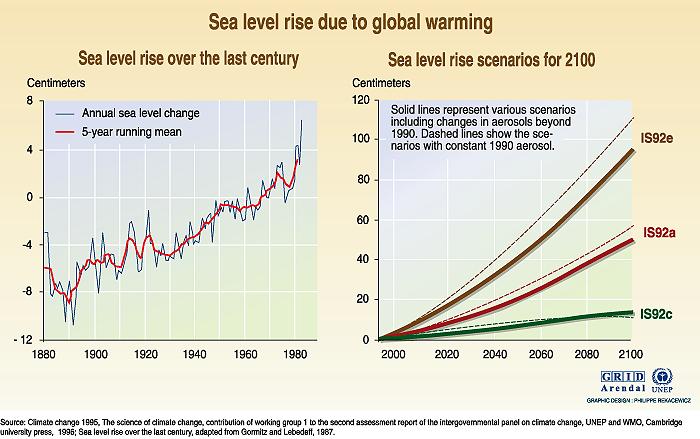
 |
Global warming is a hot topic that shows little sign of cooling down. Earth's climate is changing, but just how it's happening, and our own role in the process, is less certain. There is little doubt that the planet is warming. Over the last century the average temperature has climbed about 0.6°C around the world.
The spring ice thaw in the Northern Hemisphere occurs 9 days earlier than it did 150 years ago, and the fall freeze now typically starts 10 days later. The 1990's was the warmest decade since the mid-1800s, when record-keeping started. The hottest years recorded: 1998, 2002, 2003, 2001, and 1997. (reference)
A multinational Arctic Climate Impact Assessment (ACIA) report recently concluded that in Alaska, western Canada, and eastern Russia, average temperatures have increased as much as 3 to 4°C in the past 50 years. The rise is nearly twice the global average. The United Nations' Intergovernmental Panel on Climate Change (IPCC) projects that global temperatures will rise an additional 1.6 to 5.5°C by century's end.
Over the last million years the Earth has fluctuated between colder and warmer periods. The shifts have occurred in roughly 100,000-year intervals thought to be regulated by sunlight. Earth's sunlight quota depends upon its orbit and celestial orientation.
But changes have also occurred more rapidly in the past. During the last ice age, approximately 70,000 to 11,500 years ago, ice covered much of North America and Europe, yet sudden, sometimes drastic, climate changes occurred during the period. Greenland ice cores indicate one spike in which the area's surface temperature increased by 9°C in just 10 years.
Rising temperatures have a dramatic impact on Arctic ice, which serves as a kind of 'air conditioner' at the top of the world. Since 1978 Arctic sea ice area has shrunk by some 9% per decade, and thinned as well.
In the Amazon, for example, the same amount of rain continues to fall each year even though the cloud cover has changed. What happens if the region starts to dry up? It could be catastrophic! This is already happening in Africa, where the equatorial forests are not doing as well as they did in the 1980's. Northern Mexico has become drier and in Siberia the temperature has actually dropped.
Over the last 100 years, the global sea level has risen by about 10 to 25 cm. Sea level change is difficult to measure. Relative sea level changes have been derived mainly from tide-gauge data. In the conventional tide-gauge system, the sea level is measured relative to a land-based tide-gauge benchmark. The major problem is that the land experiences vertical movements (e.g. from isostatic effects, neotectonism, and sedimentation), and these get incorporated into the measurements. (reference)
However, improved methods of filtering out the effects of long-term vertical land movements, as well as a greater reliance on the longest tide-gauge records for estimating trends, have provided greater confidence that the volume of ocean water has indeed been increasing, causing the sea level to rise within the given range.

It is likely that much of the rise in sea level has been related to the concurrent rise in global temperature over the last 100 years. On this time scale, the warming and the consequent thermal expansion of the oceans may account for about 2-7 cm of the observed sea level rise, while the observed retreat of glaciers and ice caps may account for about 2-5 cm. Other factors are more difficult to quantify. The rate of observed sea level rise suggests that there has been a net positive contribution from the huge ice sheets of Greenland and Antarctica, but observations of the ice sheets do not yet allow meaningful quantitative estimates of their separate contributions. The ice sheets remain a major source of uncertainty in accounting for past changes in sea level because of insufficient data about these ice sheets over the last 100 years.
You want to share some ideas, or data with the visitors of the Corrosion Doctors Web siteplease send a note to our